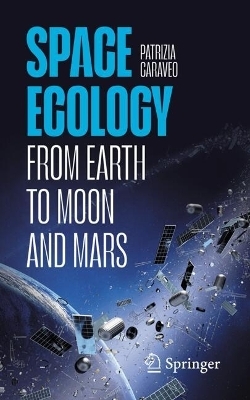
Space Ecology
Springer International Publishing (Verlag)
978-3-031-78343-2 (ISBN)
- Noch nicht erschienen - erscheint am 27.04.2025
- Versandkostenfrei innerhalb Deutschlands
- Auch auf Rechnung
- Verfügbarkeit in der Filiale vor Ort prüfen
- Artikel merken
Patrizia Caraveo is Research Director at the Istituto Nazionale di Astrofisica (INAF) and works at the Istituto di Astrofisica Spaziale e Fisica Cosmica in Milan, where she was Director from 2011 to 2017. She is also Professor at the University of Pavia. She has worked on several international space missions dedicated to particle physics and has received various awards: In 2009, she won the Premio Nazionale Presidente della Repubblica, and in 2007, 2011, and 2012, she shared the Bruno Rossi Prize of the American Astronomical Society with her colleagues Swift, Fermi, and Agile. In 2014, she received an Outstanding Achievement Award from Women in Aerospace Europe and was included by Thomson Reuters in the list of highly cited researchers for Space Science. In 2017, she was awarded the title Commendatore dell'Ordine al Merito della Repubblica Italiana. In 2021 she won the Enrico Fermi prize awarded by the Società Italiana di Fisica (SIF).
Space ecology.- Terrestrial - space as part of the environment to be preserved.- Low Earth Orbit - the proliferation of constellations and the dangers of collisions.- Avoiding Kessler syndrome.- Orbital traffic and the need to regulate it.- In-orbit refueling to limit the number of launches.- Debris-norms for the re-entry of satellites and launcher parts.- Atmospheric pollution caused by launch exhaust and debris from satellite destruction upon reentry into the atmosphere.- Lunar ecology.- Eco-sustainable exploitation.- The problem of dust (charged and toxic).- Preserving "historic" places (which do not belong to any state but should be protected).- Avoid electromagnetic pollution of the moon's hidden face to allow construction of radio telescopes.- Planetary protection beware of contamination- goes both ways.- Quarantined lunar astronauts (but we now know that the measures were not effective).- Sterilized probes (as much as possible) to avoid carrying our bacteria around the solar system.- Cospar regulations for planetary protection.- Space Law.- 1967 UN treaty.- National laws and international agreements.
| Erscheint lt. Verlag | 27.4.2025 |
|---|---|
| Zusatzinfo | Approx. 200 p. 25 illus., 10 illus. in color. |
| Verlagsort | Cham |
| Sprache | englisch |
| Original-Titel | Ecologia spaziale - Dalla Terra alla Luna a Marte |
| Maße | 155 x 235 mm |
| Themenwelt | Naturwissenschaften ► Biologie ► Ökologie / Naturschutz |
| Naturwissenschaften ► Physik / Astronomie ► Astronomie / Astrophysik | |
| Recht / Steuern ► EU / Internationales Recht | |
| Schlagworte | exploration vs exploitation • mining celestial bodies • orbital occupation • Space Law • space sustainability |
| ISBN-10 | 3-031-78343-3 / 3031783433 |
| ISBN-13 | 978-3-031-78343-2 / 9783031783432 |
| Zustand | Neuware |
| Haben Sie eine Frage zum Produkt? |
aus dem Bereich


